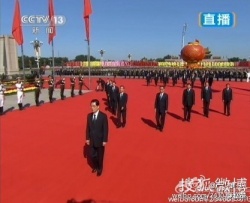“Nine elders”的版本间的差异
来自China Digital Space
| 第1行: | 第1行: | ||
| − | + | ==jiǔ zhǎnglǎo | [[九长老]]== | |
| − | [[File:nine elders.jpg|250px|thumb|right|''March of the nine elders | + | [[File:nine elders.jpg|250px|thumb|right|''March of the nine elders'']] The nine members of the Politburo Standing Committee (PSC) from to 2007 to 2012: Hu Jintao, Wu Bangguo, [[king of the silver screen|Wen Jiabao]], Jia Qinglin, Li Changchun, [[heir apparent|Xi Jinping]], Li Keqiang, He Guoqiang, and Zhou Yongkang. The “nine elders” represented the ultimate decision-making body within the Chinese government. |
| − | The number of PSC members was reduced to seven in the 2012-2013 leadership transition. Two from the | + | The number of PSC members was reduced to seven in the 2012-2013 leadership transition. Two from the cohort now lead China: President [http://chinadigitaltimes.net/china/xi-jinping Xi Jinping] and Premier [http://chinadigitaltimes.net/china/li-keqiang Li Keqiang]. |
See also [[nine presidents]]. | See also [[nine presidents]]. | ||
[[Category:Lexicon]][[Category:Party and State]] | [[Category:Lexicon]][[Category:Party and State]] | ||
2021年4月19日 (一) 18:07的版本
jiǔ zhǎnglǎo | 九长老
The nine members of the Politburo Standing Committee (PSC) from to 2007 to 2012: Hu Jintao, Wu Bangguo, Wen Jiabao, Jia Qinglin, Li Changchun, Xi Jinping, Li Keqiang, He Guoqiang, and Zhou Yongkang. The “nine elders” represented the ultimate decision-making body within the Chinese government.
The number of PSC members was reduced to seven in the 2012-2013 leadership transition. Two from the cohort now lead China: President Xi Jinping and Premier Li Keqiang.
See also nine presidents.





